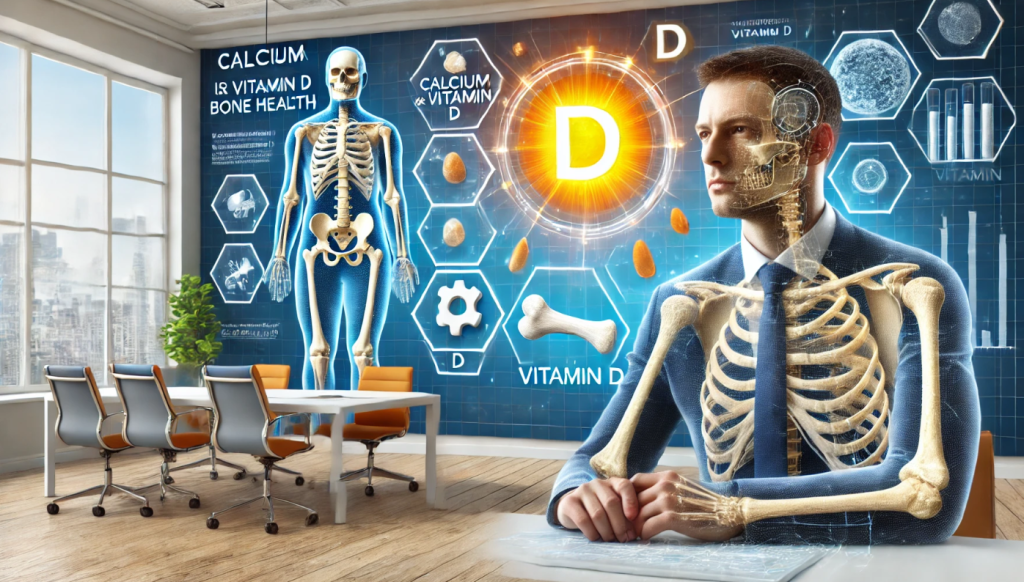Strengthening bones is a vital aspect of overall health, especially as the risk of osteoporosis increases with age. Strong and healthy bones help prevent fractures and support an active lifestyle. Let’s explore the key methods to strengthen your bones.
1. Nutrition for Bone Health
- Calcium: The main building block of bones. Sources: dairy products, almonds, broccoli, sardines.
- Vitamin D: Helps the body absorb calcium. Best sources: sunlight, fatty fish, eggs, fortified foods.
- Magnesium and Zinc: These minerals are also crucial for bone health. Sources: nuts, seeds, whole grains.
- Collagen-Rich Foods: Bone broths, gelatin, and supplements support bone structure.
2. Physical Activity

- Strength Training: Weight-bearing exercises stimulate bone tissue to grow stronger.
- Cardio Exercises: Walking, running, and dancing help maintain bone density.
- Yoga and Pilates: These activities improve balance and flexibility, reducing the risk of falls.
3. Avoiding Bad Habits
- Smoking: Nicotine decreases bone density.
- Alcohol: Excessive alcohol consumption hinders calcium absorption.
- Caffeine: Limit caffeine intake as it may deplete calcium levels.
4. Weight Management

- Excess weight puts strain on bones, increasing the risk of injuries.
- Maintaining a healthy weight reduces pressure on joints and bones.
5. Medical Monitoring

- Regularly check your bone density, especially if there’s a family history of osteoporosis.
- Discuss the need for calcium or vitamin D supplements with your doctor.
6. Foods to Avoid
- Salty Foods: High salt intake can cause calcium loss through urine.
- Carbonated Drinks: Contain phosphoric acid, which may hinder calcium absorption.
Conclusion
Caring for your bone health is a long-term commitment requiring proper nutrition, an active lifestyle, and avoiding harmful habits. Strengthening bones is achievable at any age by following these recommendations and undergoing regular medical check-ups.
How to Strengthen Bones: A Comprehensive Guide for Better Bone Health
Bone health is essential for maintaining overall mobility and quality of life, especially as we age. Bones are living tissues that constantly rebuild and repair themselves, but as we grow older, the balance between bone loss and bone formation can shift, increasing the risk of conditions like osteoporosis and fractures. Fortunately, there are several ways to strengthen bones and maintain their health throughout life. By incorporating proper nutrition, regular exercise, and healthy lifestyle habits, you can improve bone density and resilience.
Understanding Bone Health
Bones are not static structures; they are dynamic tissues that go through a continuous process called bone remodeling. During this process, old bone tissue is broken down and replaced by new bone tissue. Up until the age of 30, bone formation usually outpaces bone loss, allowing us to build strong bones. However, after this peak bone mass period, the rate of bone loss begins to exceed bone formation, making it crucial to adopt habits that support bone health.
Several factors influence bone strength, including genetics, gender, age, and lifestyle. Women, especially postmenopausal women, are at a higher risk of bone loss due to reduced estrogen levels. However, bone health is not just a concern for older adults—it’s a lifelong process that begins in childhood.
Nutrition for Strong Bones
The foundation of strong bones lies in proper nutrition. Certain nutrients are critical for bone health:
- Calcium
Calcium is the most important mineral for bone health, as it provides the structural strength for bones and teeth. Adults generally need around 1,000–1,200 mg of calcium daily. Good sources of calcium include dairy products like milk, cheese, and yogurt, as well as non-dairy options like leafy green vegetables (spinach, kale), almonds, tofu, and fortified plant-based milks. - Vitamin D
Vitamin D is essential for calcium absorption. Without adequate vitamin D, the body cannot effectively utilize calcium, which can lead to weaker bones. Sun exposure is one of the best natural sources of vitamin D, but it can also be obtained from foods like fatty fish (salmon, mackerel), egg yolks, and fortified products. If natural sources are insufficient, vitamin D supplements may be necessary. - Magnesium
Magnesium works alongside calcium to strengthen bones. It helps regulate calcium levels and supports bone remodeling. Foods like nuts, seeds, whole grains, and dark chocolate are excellent sources of magnesium. - Protein
Protein is vital for building the collagen matrix in bones, which provides flexibility and reduces the risk of fractures. Include lean protein sources such as poultry, fish, eggs, beans, and lentils in your diet. - Other Nutrients
Vitamins K2 and C, along with trace minerals like zinc and phosphorus, also play important roles in bone health. For example, vitamin K2 helps direct calcium to bones rather than soft tissues, while vitamin C supports collagen production.
Exercise for Bone Strength
Physical activity is another critical factor in maintaining and improving bone strength. Bones adapt to the forces placed upon them, meaning that regular weight-bearing and resistance exercises can stimulate bone growth and prevent bone loss.
- Weight-Bearing Exercises
Activities like walking, running, dancing, and hiking put stress on bones, encouraging them to become stronger. Even moderate-impact exercises, such as brisk walking or stair climbing, can significantly benefit bone health. - Resistance Training
Strength training with weights or resistance bands helps build muscle, which in turn supports and strengthens bones. Exercises like squats, lunges, and deadlifts are particularly effective for targeting bone density in the hips and spine. - Balance and Flexibility Training
Yoga, tai chi, and other balance-focused activities can help improve coordination and reduce the risk of falls, which is crucial for preventing fractures, especially in older adults.
Lifestyle Habits for Healthy Bones
Beyond diet and exercise, certain lifestyle choices can have a significant impact on bone health:
- Avoid Smoking and Limit Alcohol
Smoking reduces bone density by interfering with the body’s ability to absorb calcium and produce new bone tissue. Excessive alcohol consumption also weakens bones and increases the risk of fractures. Limiting alcohol intake to moderate levels (up to one drink per day for women and two for men) is recommended. - Maintain a Healthy Weight
Being underweight increases the risk of bone loss and fractures, while being overweight can place additional stress on bones and joints. Maintaining a healthy weight through balanced nutrition and regular exercise is key to bone health. - Stay Hydrated
Proper hydration supports overall health, including bone health. Dehydration can affect joint lubrication and cartilage health, increasing the risk of injuries. - Monitor Bone Health
Regular bone density tests, especially for individuals at higher risk of osteoporosis, can help detect early signs of bone loss and guide preventive measures.
Hormonal Balance and Bone Health
Hormones play a significant role in bone density. For women, maintaining hormonal balance during menopause is crucial, as declining estrogen levels can accelerate bone loss. Hormone replacement therapy (HRT) may be an option for some women, but it should be discussed with a healthcare provider to weigh the benefits and risks.
Men can also experience bone loss due to low testosterone levels, which affect bone formation. Addressing hormonal imbalances through medical advice can help maintain bone health.
Preventing Bone-Weakening Conditions
Certain medical conditions, such as osteoporosis, can significantly affect bone strength. Prevention strategies include:
- Calcium and Vitamin D Intake: Ensure sufficient levels of these nutrients through diet or supplements.
- Regular Exercise: Engage in weight-bearing and strength-training exercises.
- Avoiding Bone-Harming Substances: Limit caffeine and salt intake, as excessive amounts can reduce calcium absorption.
Supplements for Bone Health
While it’s best to get nutrients from food, supplements can be helpful if dietary intake is insufficient. Calcium and vitamin D are the most commonly recommended supplements for bone health. However, it’s important to avoid over-supplementation, as excess calcium can lead to kidney stones or other health issues. Always consult a healthcare provider before starting any supplements.
The Importance of Early Action
Building strong bones begins in childhood and adolescence, as this is when the body develops its peak bone mass. Encouraging healthy habits, such as physical activity and a nutrient-rich diet, from a young age can reduce the risk of fractures and osteoporosis later in life.
Conclusion
Strengthening bones is a lifelong commitment that involves a combination of proper nutrition, regular exercise, and healthy lifestyle choices. By focusing on calcium and vitamin D intake, engaging in weight-bearing activities, and avoiding harmful habits, you can maintain strong and resilient bones. Whether you’re in your 20s, 50s, or beyond, it’s never too early—or too late—to take steps toward better bone health. These efforts will not only support your skeletal system but also improve your overall quality of life.
















